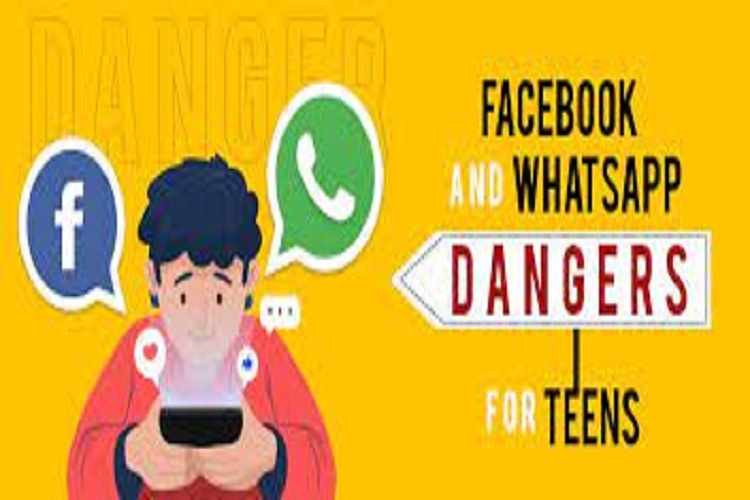Who doesn’t like sending/receiving text messages to another person in an instant? Well, WhatsApp instant messaging app allows us to do that. Gone are the days when we used to exchange text messages in a traditional way. Now, instant messaging apps have entirely changed the concept of text messaging.
Besides adults, WhatsApp is mostly used by youngsters, especially teens. They spend all day exchanging instant texts with their friends, sharing photos, videos, and what not with them. Where the app allows them to exchange text messages with people they have added to their contact, it also exposes them to online dangers that exist on the platform including but not limited to bullies and predators.

Teens believe only their WhatsApp contacts can contact them on the messaging platform but whoever has their number can reach out to them on the app. Cyberbullying, sexting, and pedophilia are among the greatest online threats that your teens may be exposed to on the app. Consider setting up privacy settings and a parental control app on your teen’s mobile phone to protect them from harmful online dangers.
How Teens Use WhatsApp
WhatsApp only works for those who have registered an account on the app. People having this app installed on their mobile device can contact another person on the app. Mostly kids and teens exchange text messages, photos, videos, and other files with their friends on the app.
They either have separate conversations or exchange messages on WhatsApp groups. When a message is sent to someone on WhatsApp, a “read receipt” tells the sender that their message has been delivered, read, seen, or played by the recipient.
With this app, teens can have private conversations with their friends. Mostly they like to be secretive about the app and do not want their parents to know about their WhatsApp activity. This is where parents start becoming concerned.
Any person who has your teen’s number can try to reach out to them on WhatsApp. They can send them a message on WhatsApp. Even though your teen has not saved that particular contact on their phone, they can still receive the message on the messaging platform.
We cannot say that WhatsApp is a safe platform for your teens because they can be contacted by anyone on the app. This messaging platform is surrounded by cyberbullies and sexual predators who can pose serious threats to your teen’s safety and wellbeing.
To protect your teens from these harmful online dangers, it is important that you know what’s going on in your teen’s life even if that includes monitoring their mobile devices and text messaging apps such as WhatsApp.
Monitor Your Teen’s WhatsApp
Your teen would like you to monitor their WhatsApp activity but this is where you need to explain to them why monitoring is important. Tell them that you do not mean to invade their online privacy. The purpose of installing parental control apps and setting up privacy settings on the app is to keep them safe from online threats on the app.
By monitoring their WhatsApp chat and call logs, you can find out who your teen is talking to and what sort of conversations they are having with others. If you find them exchanging messages with a stranger or a sexual predator, you can instantly stop them from doing that.
On the other hand, if you see them getting threatened or bullied by someone on the platform, again you can intervene at the right time and save your kid from getting affected by cyberbullying. Monitoring their WhatsApp activity can help you know whether your teen is safe on the app or not.
Manage What Your Teen Can See on WhatsApp
You can also manage what you would like your teen to see on WhatsApp. You need to make sure that your teen only receives messages from people they can fully trust. If some stranger tries to contact your teen on the app, they can block, report, or simply delete them.
Block or Delete Users
Once you block a user on WhatsApp, they can no longer contact you on the app. If your teen has blocked someone on the app, they won’t be able to see your status, profile image, and last seen information that your teen has shared on the app.
However, you need to remember that when your teen blocks a contact from their WhatsApp, it won’t remove them from their WhatsApp list on their phone nor it is going to remove your teen from the list on that contact’s phone. It just means they won’t be able to connect with your teen on the app.
If your teen wants to delete a contact in their WhatsApp then they need to delete that contact from their phone’s contact list.
Report Spam
In case your teen receives a message from an unknown contact on their WhatsApp, they can always report spam and block them. A random stranger can try to send your teen a message on WhatsApp or someone can try to send your teen inappropriate stuff on the app. In such a situation, it is better to report spam and then block that particular contact from the app. By doing this, they can report the user and add them to their blocked list.
Cyberbullies and online predators are always looking for innocent teens on instant messaging apps like WhatsApp. Make sure you protect them by installing monitoring and parental control apps on their devices so you can keep a check on their WhatsApp conversations and activity.

